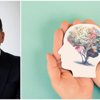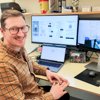Fritextsökning
Artiklar per år
Innehållstyper
-

Anna Törner: Vem betalar för Rebecca Doe – och alla oss andra?
Det lätt att vänja sig vid tanken att vård och läkemedel är gratis, när det egentligen handlar om hur och vem som betalar. Det skriver Anna Törner i en krönika.
-

Government apoints new experts to medicine and health council
Johanna Fälting, Head of Research at BioArctic, and physician Markus Lingman have been appointed as new members of the Swedish Research Council’s Subject Council for Medicine and Health.
-

Marie Gårdmark: “What to expect from Trump’s second term?”
One may complain about the complex multinational system in EU, but it gives us some predictability that cannot be easily overturned by different member states political agendas, writes Marie Gårdmark in a column.
-

Life science trends 2025 – Neurology
New Alzheimer's drugs are beginning to be used in Sweden, more deals in the neuro sector are expected, and tools for deliver active substances across the blood-brain barrier are being developed. In addition, a new type of drug for MS is making its debut. This part of trend insights on life science 2025 is about neurology.
-

Digitala tvillingar blir verklighet i primärvården – ”Som en tamagotchi”
Att möta sin egen digitala tvilling och se vad som händer med kroppen om man slutar röka eller ändrar diet? Det ska testas vid besök på vårdcentraler i Östergötland.
-

The business coach: “We need to learn from our mistakes”
The past year has been challenging for many biotech companies, with several comapanies facing financial stress and bankruptcy. To understand how entrepreneurs can navigate these tough times, Life Science Sweden spoke to Pia Keyser, a business coach at Umeå Biotech Incubator, who has worked with many companies in the industry.
-

Large study: The benefits and risks of obesity medications
Medications such as Ozempic can reduce the risk of a range of different diseases and health conditions but also increase the risk of others. This is according to a large American study where the connections between GLP-1 receptor agonists and the risk of a variety of health outcomes have been examined.
-

AI upptäcker tumörsjukdom – via röstinspelning
En kort röstinspelning tillsammans med ansiktsbilder – i bägge fallen analyserade med en AI-algoritm – kan göra det möjligt att upptäcka den sällsynta tumörsjukdomen akromegali och sätta in behandling i ett tidigt skede.
-

He takes over the chairmanship of Karolinska Development
Ben Toogood is appointed as the new chairman of Karolinska Developments.
-

The US is leaving the WHO
The newly installed US President, Donald Trump, has issued an executive order for the US to leave the World Health Organization, WHO.
-

Sensorer som lossnar och buggar i appar – fler klagomål på medicinteknik
Läkemedelsverkets nya e-tjänst för anmälan av problem med medicintekniska produkter har lett till en markant ökning av rapporter från privatpersoner. Särskilt många av anmälningarna gäller produkter för personer med diabetes.
-

How the Foreign Office will promote Swedish life science exports
The broadness and innovative strength keep Swedish life science exports strong, but the protectionist tendencies in the world are worrying, says Camilla Mellander, Director General for Trade, in an interview.
-

Life science trends 2025 – The economy
Upcoming patent expirations are driving pharmaceutical companies to acquire in 2025. In Sweden, we may be on our way to brighter times and fewer bankruptcies. Today´s part of the series with trend insights in life science for 2025 is about the economy.
-

Life science trends 2025 – Part 1 obesity drugs
More obesity drugs are being launched this year following Novo Nordisk and Eli Lilly's previous successes with GLP-1 drugs. But the next big breakthrough in obesity has a different mechanism of action, writes Samuel Lagercrantz in the first article in a series of trend insights for 2025. Today: obesity.
-

FDA approves new cystic fibrosis therapy
A new treatment for cystic fibrosis has been approved by the U.S. Food and Drug Administration (FDA).
-

New cell therapy raises hope for curing type 1 diabetes – "Never succeeded before"
For the first time, a patient with type 1 diabetes has undergone an islet transplantation using genetically modified insulin-producing cells that do not require immunosuppressive drugs. "A major immunological breakthrough," says Professor Per-Ola Carlsson, who leads the clinical study, to Life Science Sweden.